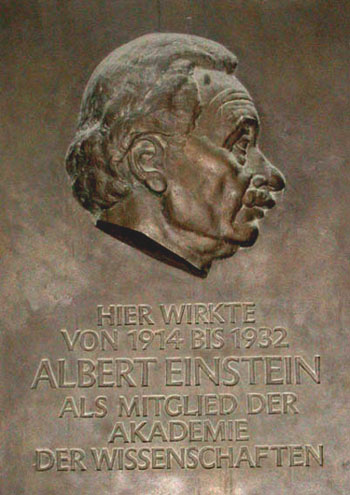The Simple Past Tense (also called the Imperfect or Preterite) in English:
The simple past describes an event within a time frame that is completed (compare the simple past “I cooked twice this week” with the present perfect, “I have cooked twice this week” – the former implies that that’s all the cooking I’m going to do, while the latter leaves open the possibility that I might cook more).
English forms this tense in several ways:
- Weak verbs add -ed: “looked,” “wanted,” “worked,” etc.
- Strong, or irregular, verbs generally change the vowel in the stressed syllable. A variety of other changes are possible, as well: “ate,” “sang,” “held,” “went,” “thought,” etc.
|
|
 |
|
Albert Einstein was active here from 1914 to 1932 as a member of the Academy of Science |
|
The Simple Past Tense (das Präteritum, das Imperfekt) in German:
In German, as in English, the simple past differs from the present perfect, in that it describes past events that are interrelated within a time frame that is separate from the present. Hence it is typically used in narratives. German speakers are not always careful in making this distinction. Indeed, they sometimes even mix the two tenses indiscriminately.
Weak verbs form the simple past by adding
-(e)te,
-(e)test,
-(e)ten, or
-(e)tetto the stem:
| Ich sagte das. |
I said that. |
| Wir machten die Tür zu. |
We closed the door. |
| Du kauftest zu viel. |
You bought too much. |
| Ihr wohntet neben uns. |
Y’all lived next to us. |
| Sie arbeiteten hart. |
You worked hard. |
| Es regnete stark. |
It rained hard. |
| Sie redeten viel. |
They talked a lot. |
The irregular weak verbs, including the modal auxiliaries, add these same endings to a (usually) changed stem:
| Ich wollte das hören. |
I wanted to hear that. |
| Wir durften das nicht sagen. |
We weren’t allowed to say that. |
| Du nanntest ihn Hans. |
You named him Hans. |
| Ihr wusstet das schon. |
Y’all knew that already. |
| Sie konnten das nicht wissen. |
You couldn’t know that. |
| Sie brachte den Wein. |
She brought the wine. |
| Sie verbrannten die Bücher. |
They burned the books |
|
|
 |
|
In the middle of this square on May 10, 1933, National-Socialist students burned the works of hundreds of independent writers, publicists, philosophers, and academicians |
|
The remaining
strong verbs (usually) change the stem and add either no ending or
-st,
-en, or
-t:
| Ich ging nach Hause. |
I went home. |
| Wir sahen ihn nicht. |
We didn’t see him. |
| Du sprachst zu schnell. |
You spoke too fast. |
| Ihr halft uns nicht. |
Y’all didn’t help us. |
| Sie schliefen lang. |
They slept late. |
| Sie las das Buch. |
She read the book. |
| Sie schrieben es auf Deutsch. |
They wrote it in German. |
These irregular forms fall into distinct categories. Here is a list of the most common strong verbs, arranged in those groups.
|
|
 |
|
Erich Romann lived here until 1935, when, under pressure from the Nazi regime, he took his own life |
|
Further distinctions between the simple past and the present perfect: in spoken German, the simple past is perceived as formal. Colloquial narratives often use the present perfect tense: “Ich bin nach Hause gegangen und habe meinem Mann gesagt….”
Indeed, many dialects do not have a simple past.
1 The simple past is reserved for more formal narratives; novels are one example.
In ordinary conversation, then, the simple past is unusual. There are however, a few exceptions, primarily the verbs “sein,” “haben,” and the modal auxiliaries. It is quite common to say: “ich war da”, instead of “ich bin da gewesen”; “wir hatten eine Katze”, instead of “wir haben eine Katze gehabt”; or “sie konnte ihn sehen”, rather than “sie hat ihn sehen können.” This is particularly true when it serves to cut down on complexity. Even in ordinary speech it is more usual to say “ich musste einen Arzt rufen lassen” than “ich habe einen Arzt rufen lassen müssen.”
|
|
 |
|
Brothers Grimm: Snow White and Rose Red
There was once a poor widow who lived in a lonely cottage. In front of the cottage was a garden in which two rose-trees stood, one of which bore white and the other red roses. She had two children who were like the two rose-trees, and one was called Snow White, and the other Rose Red. |
|
As in the present tense, the finite verb might have a separable prefix, which then goes to the end of the clause:
| Wir kauften immer montags ein. |
We always shopped on Monday. |
| Sie brachte ihren neuen Freund mit. |
She brought her new boyfriend along. |
| Er lud uns dieses Mal nicht ein. |
He didn’t invite us this time. |
| Er rief seine Mutter nie an. |
He never phoned his mother. |
As a result, ordinary speakers have forgotten the preterite form of some strong verbs that are traditionally used informally. The third person past of
backen (“to bake”) was once
buk or
bük, but few Germans know that anymore, even though the past participle of
backen remains strong:
gebacken. In the 3rd person singular, both
bäckt and
backt are possible.
The verb
hauen provides another example. When it is used to mean “to hew,” its past form can still be
hieb (although
haute is more common). But when used with slang expressions like
Ich haue dir eins auf die Fresse (“I’ll pop you one in the chops”) or
hau ab!(“buzz off!”), the simple past form is
haute – of course, the less formal present perfect is even more likely:
Er ist endlich abgehauen(He finally left). See also
mahlen (“to grind” [grain, coffee]):
mahlte, gemahlen.
Similarly, the
ihr or even
du forms, which are by definition informal, can sound a bit odd – or even poetic – in the simple past:
du gingst, ihr wusstet.]]>

